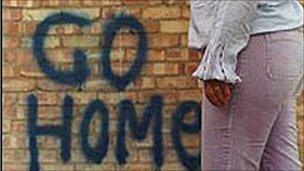Is sectarianism racism?
- Published
- comments

The United Nation's Committee for the Elimination of all forms of Racial Discrimination has been taking evidence in Geneva from various UK pressure groups, including a number of Northern Ireland-based lobbyists.
These included representatives from the travelling community, the Committee on the Administration of Justice, the trade union Unison and the Northern Ireland Council for Ethnic Minorities.
During the session an interesting divide opened up between the Council for Ethnic Minorities and the local Human Rights Commission on the topic of whether sectarianism should be treated as another form of racism.
Back in May, the NI Human Rights Commission made a written submission to the Geneva committee in which it argued that "sectarianism in Northern Ireland should be treated as a 'subset' or particular manifestation of racism".
The commission argued that viewing sectarianism as "Protestant-Catholic religious prejudice, political factionalism, or even 'tribalism' " placed it outside the context of well-established international human rights law, specifically the International Convention on the Elimination of All Forms of Racial Discrimination, which came into force back in 1969.
The commission said sectarianism could be looked at as a particular form of racism, on a par with anti-semitism or Islamophobia.
It quoted those two examples, together with anti-Sikh discrimination, as areas in which it had been accepted there is an overlap or "intersectionality" between religious and racial discrimination.
But the Council for Ethnic Minorities director, Patrick Yu (himself a former member of the Human Rights Commission), has expressed strong reservations about the "sectarianism is racism" argument.
Mr Yu told the Geneva committee that race relations in Northern Ireland fails to attract sufficient political commitment, and tends to be subsumed under a general "good relations" agenda.
He contended that it "would be very unwise to conflate issues of sectarianism and racism".
To extend race relations law in this way, he maintained, would "draw the courts and others into disputes about parading, Irish language and issues that are 'majority' concerns in that they affect Protestants/unionists and Catholics/nationalists, but not the minority racial and religious groups found in NI."
Mr Yu worried that such a strategy could "potentially undermine many of the gains already made (e.g. domestic legislation penalising crime that is motivated by either racism or sectarianism).
So if discriminating against a Muslim, a Jew or a Sikh is racist, should discriminating against a Protestant or Catholic be considered in exactly the same way?
The UN Committee has yet to make its view clear - according to its website, external one committee member asked for further clarification on the Human Rights Commission's arguments.